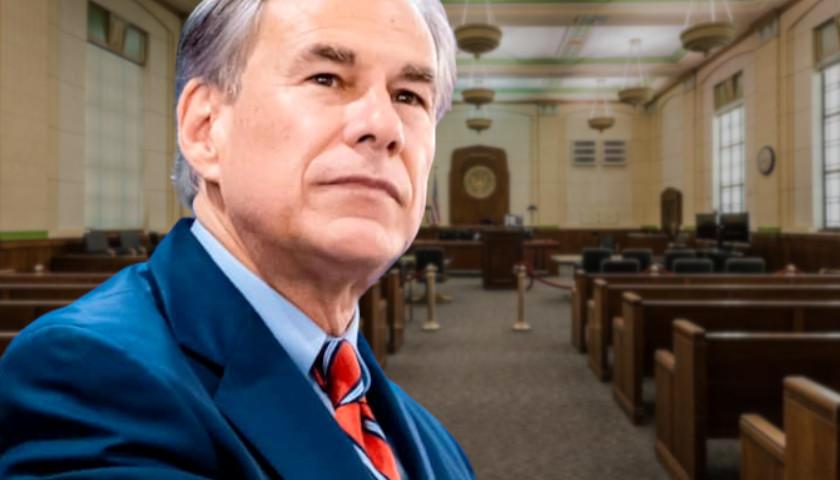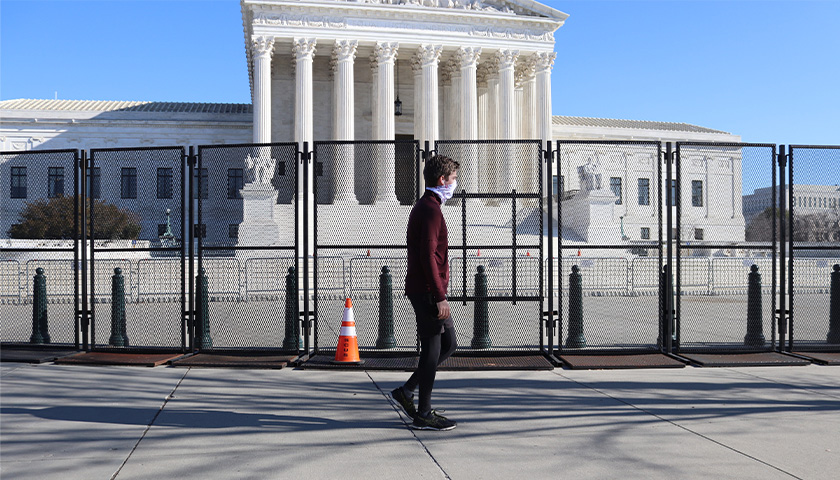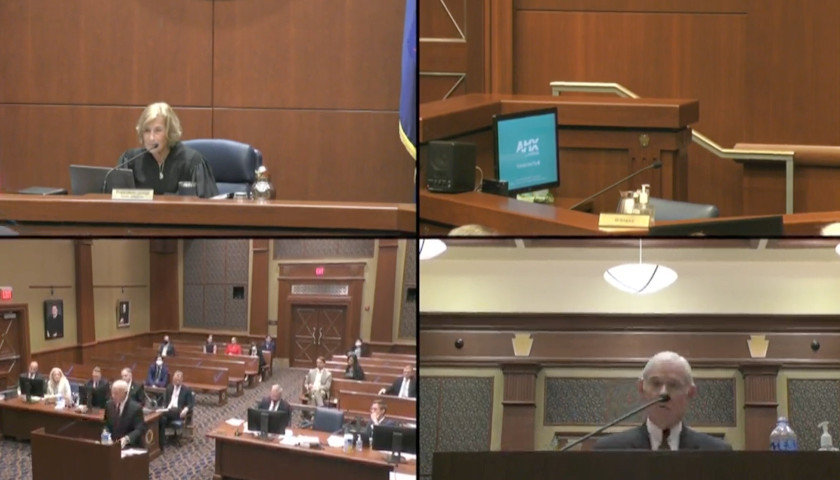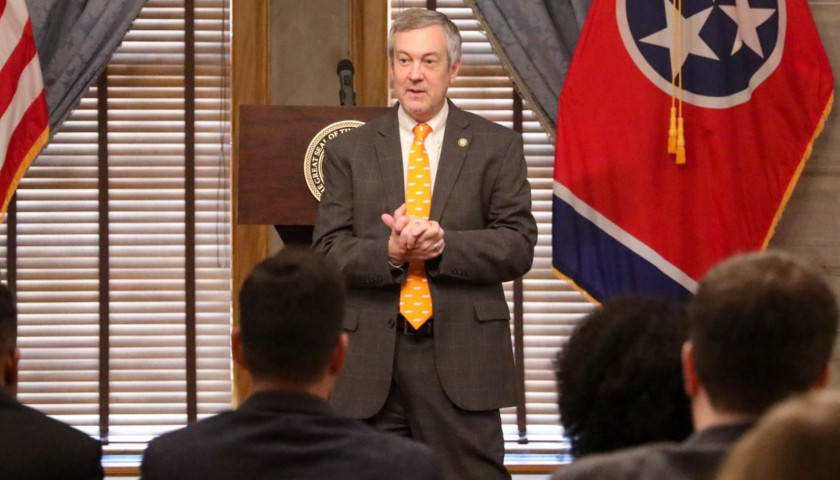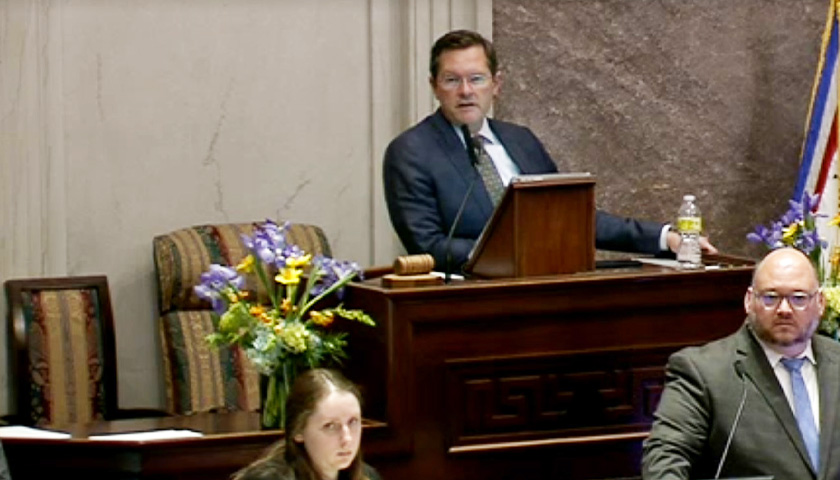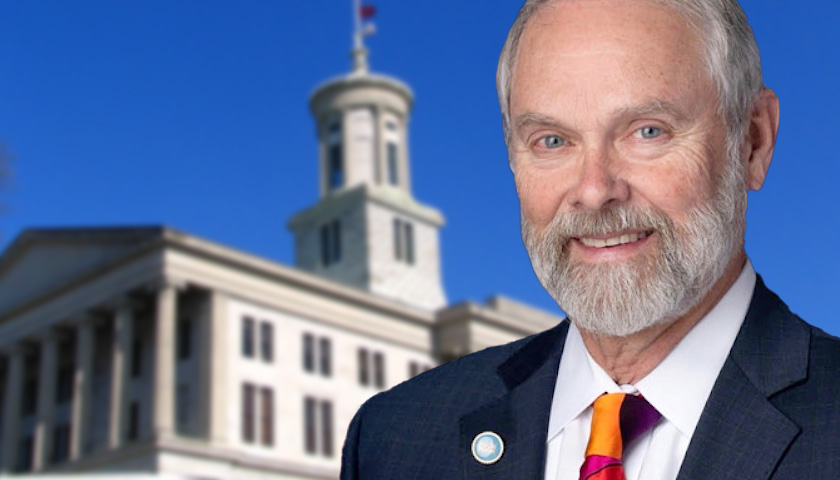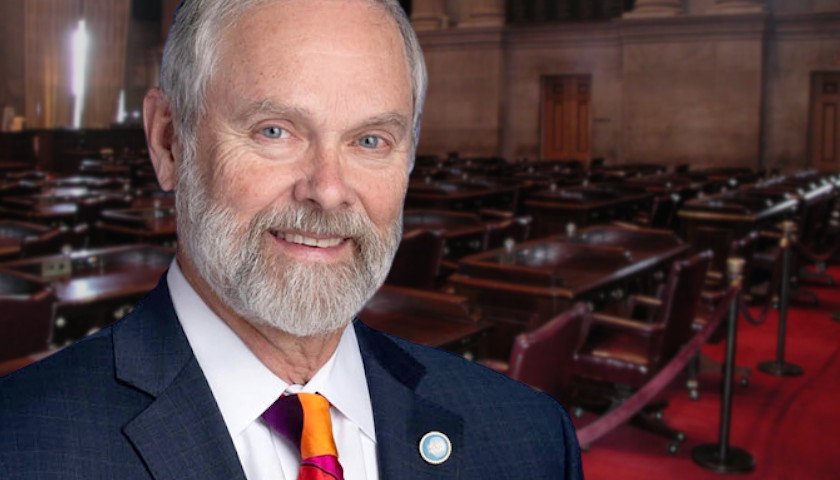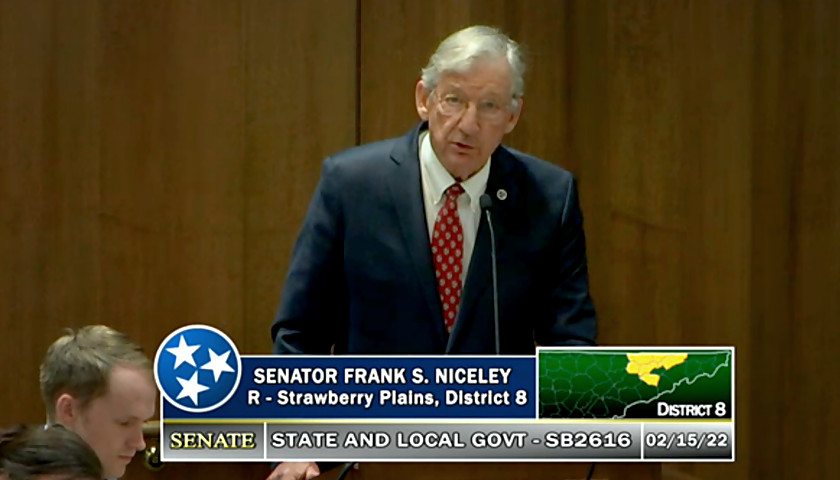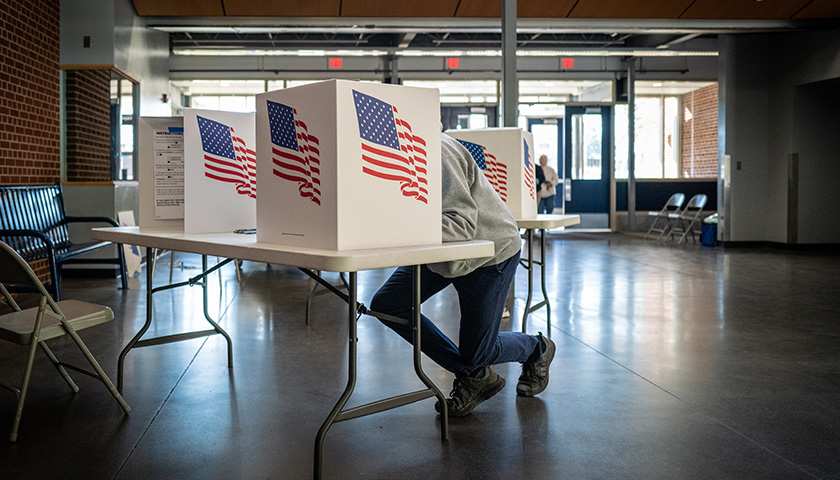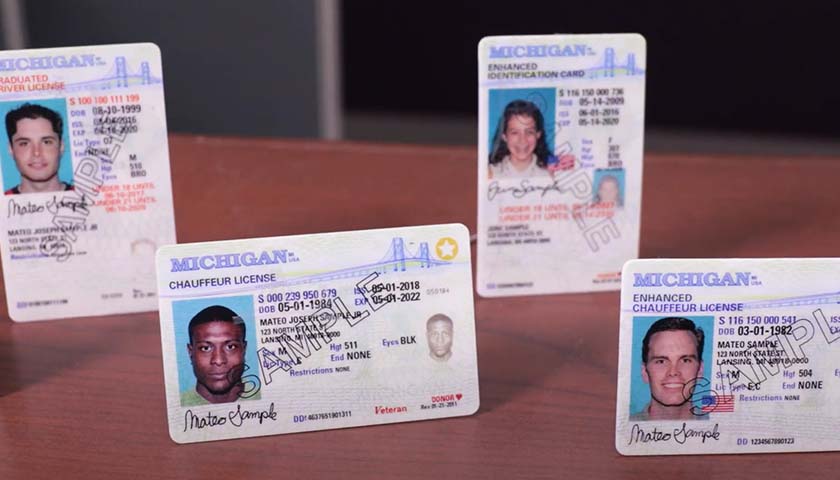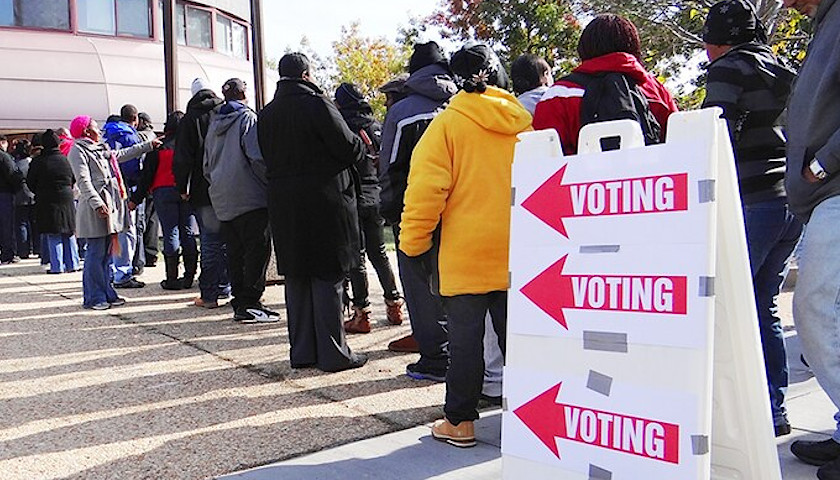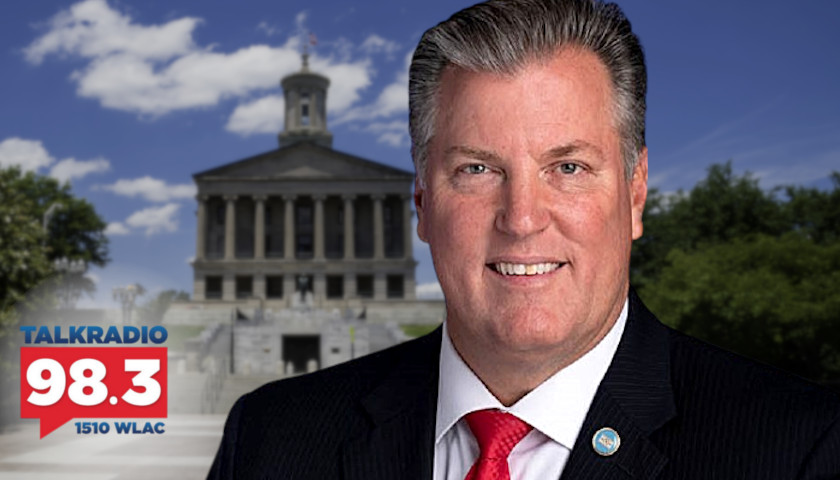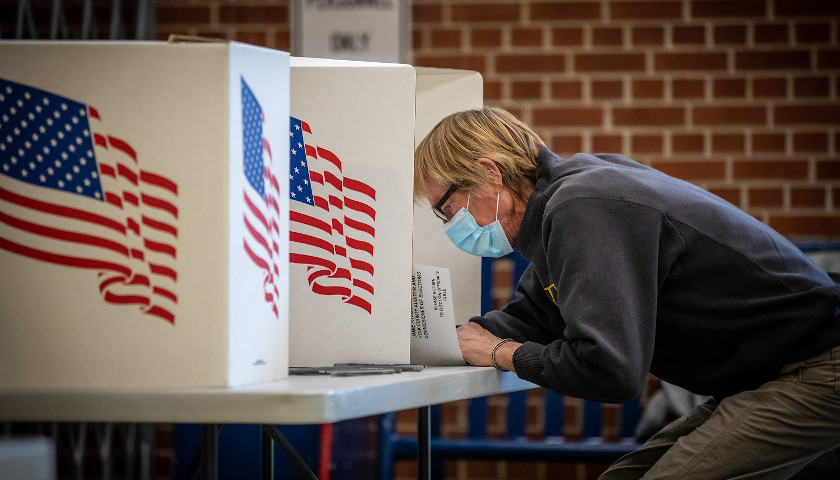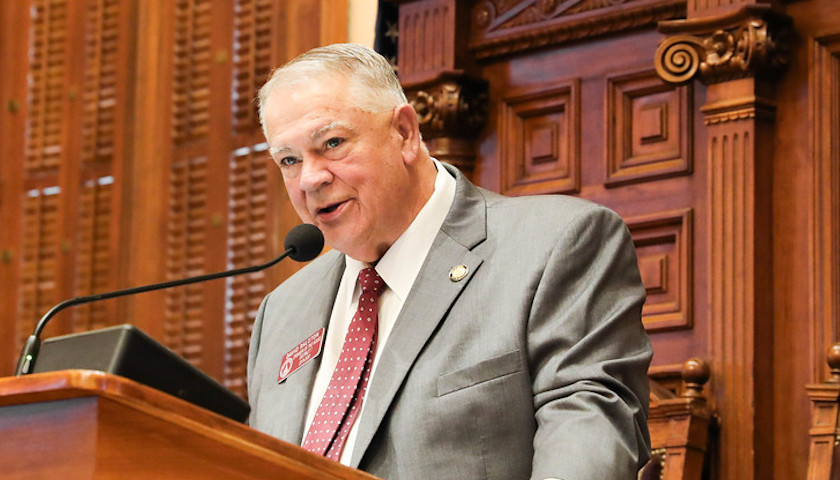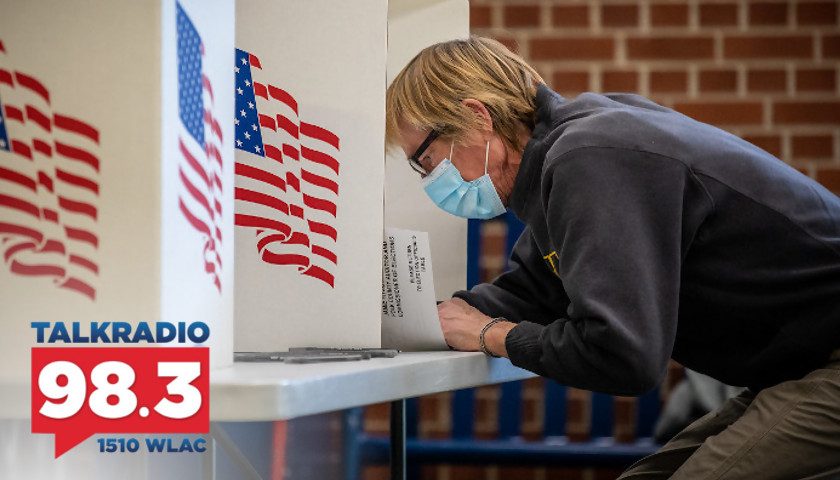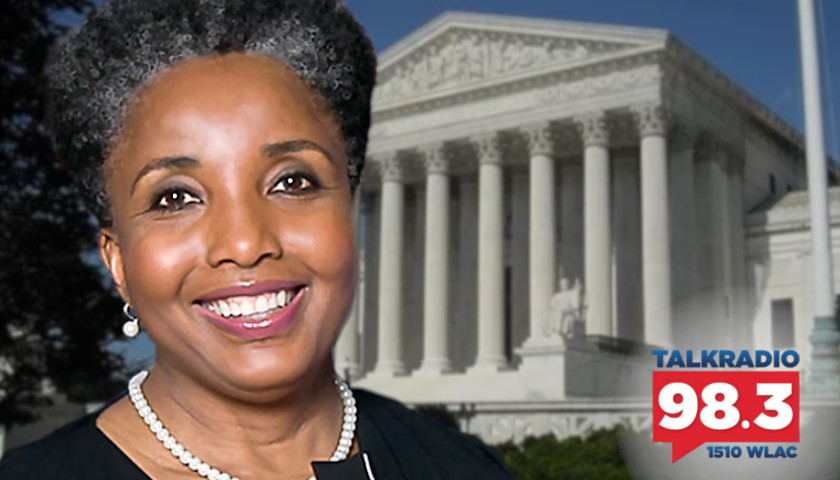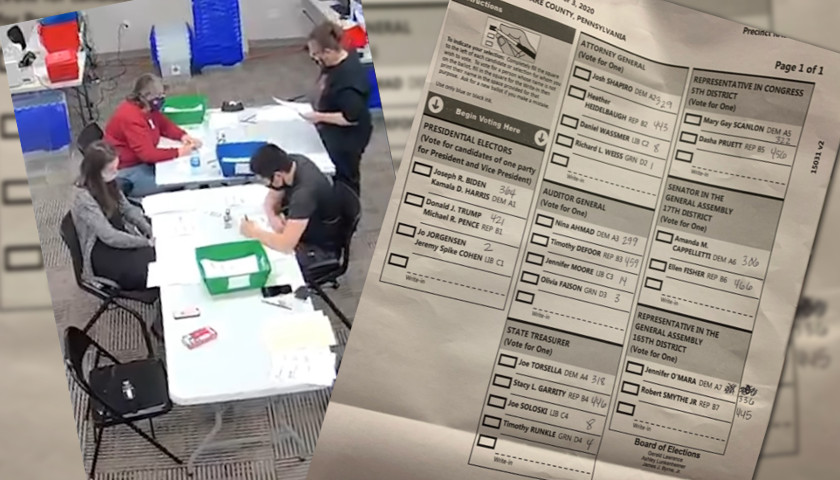The progressive Knight Foundation conducted a seminar on September 5 to educate journalists about election law for the upcoming 2024 general election. Co-sponsored with the American Bar Association’s Task Force for American Democracy, the speakers consisted of election fraud deniers, including activists like David Becker of The Center for Election Innovation & Research.
Read the full storyTag: Election Law
Judge Says That Texas Election Law Is Unconstitutional
A new Texas law that changes voting rules in the populous city of Houston has been called unconstitutional by a state court, according to an injunction issued Monday.
On June 18, Republican Gov. Greg Abbott of Texas signed into law Senate Bill 1750, which abolishes the position of “elections administrator” that had previously overseen elections in Harris County, which includes the City of Houston. The state then was sued by left-wing and Democratic groups, arguing that the bill would adversely affect the city’s mayoral election being held this November, which led to a state judge imposing a temporary injunction Monday evening.
Read the full storyWisconsin Legislative Budget Committee Axes Controversial Plan for Office of Election Transparency and Compliance
The Legislature’s Joint Finance Committee this week rejected a plan by the Wisconsin Elections Commission (WEC) to create a $2 million Office of Election Transparency and Compliance.
While the proposed bureaucracy’s name suggests election integrity, it would be built by WEC Administrator Meagan Wolfe, the same bureaucrat who has presided over an agency riddled with election integrity complaints and election law violations.
Read the full storyCommentary: Moore v. Harper Terrifies Democrats for Good Reason
The U.S. Supreme Court finally heard oral arguments in Moore v. Harper last week. The case involves a mundane constitutional issue concerning the definition of “legislature” as used in the elections clause. Yet it has produced panic among Democrats and a torrent of portentous predictions about the death of democracy from various leftist law professors. In the Washington Post, for example, Harvard University’s Noah Feldman expressed alarm that the court took up the “insane” case at all.
Is Moore v. Harper really insane? Of course not. The case arose early this year when the North Carolina Supreme Court struck down a redistricting map produced by the state Legislature, then replaced it with a redistricting scheme of its own. The North Carolina General Assembly petitioned SCOTUS for relief on the grounds that this action violated Article I, Section 4 of the U.S. Constitution.
Read the full storyCrom’s Crommentary: Proposes Repercussions for Elite Left-Wing Law Schools’ Debate-Stifling Stance
Monday morning on The Tennessee Star Report, host Leahy welcomed the original all-star panelist Crom Carmichael to the studio for another edition of Crom’s Crommentary.
Read the full storyOz’s Counsel to Commonwealth Court: ‘The Voters of Pennsylvania Have Spoken’
Attorneys for Senate candidate Dave McCormick on Monday found themselves in the atypical position of arguing in Commonwealth Court alongside Pennsylvania’s Democratic Secretary of State about which ballots to count.
The Republican and former hedge-fund executive is challenging the vote-counting standard that has determined the gap of 922 votes between him and his leading primary opponent, celebrity surgeon Mehmet Oz.
Read the full storyPennsylvania Senate Nomination Could Hinge upon Mail-In Ballot Decision
The determination of Pennsylvania’s unsettled Republican Senate nomination battle between Mehmet Oz and Dave McCormick could depend on a federal court decision regarding undated mail-in ballots.
As of Sunday afternoon, Oz held 418,535 votes to McCormick’s 417,465, putting the former ahead by far less than the 0.5 percent maximum gap that triggers an automatic recount. While over 99 percent of all ballots cast in the election have been counted, an ongoing dispute about whether undated absentee ballots should be deemed valid has the potential to erase Oz’s lead.
Read the full storySilicon Valley Billionaire Larry Ellison Donated the $1 Million That Funds SuperPAC Backing TN-5 Carpetbagger Candidate Morgan Ortagus
Silicon Valley billionaire Larry Ellison, the executive chairman and chief technology officer of Oracle, donated $1 million on March 21 to the recently-formed SuperPAC supporting TN-5 carpetbagger candidate Morgan Ortagus, according to Federal Election Commission records obtained by The Tennessee Star on Friday.
That SuperPAC, the Tennessee Conservatives PAC, has already begun running a $100,000 radio ad buy in the district in support of Ortagus.
Read the full storyTennessee Secretary of State’s Office Provides Partial Clarification on Applicability of Law to Carpetbaggers Morgan Ortagus and Robby Starbuck, but Leaves Out Key State Code
The Tennessee Secretary of State’s office provided partial clarification on the applicability of the newly enacted three-year residency law to carpetbaggers Morgan Ortagus and Robby Starbuck, but left out a reference to a key part of state code.
The Tennessee Star previously reported that mere hours after the enactment of the new three-year residency law for federal candidates in primaries, Tennessee Secretary of State Tre Hargett’s office offered conflicting comments about whether he intends to enforce the new law and remove “carpetbagger” candidates from the August 4 Republican primary ballot.
Read the full storyTN Secretary of State Offers Conflicting Comments on Whether He Will Enforce Residency Law and Remove Carpetbaggers from the TN-5 Ballot
Within hours of the enactment of a new law on Wednesday that requires candidates for the U.S. House of Representatives in Tennessee to be residents of the state for three years prior to their placement on a primary ballot, Tennessee Secretary of State Tre Hargett’s office offered conflicting comments about whether he intends to enforce the new law and remove “carpetbagger” candidates from the August 4 Republican primary ballot.
Reaction from Tennessee state legislators to the comments from the Secretary of State’s office were swift and pointed.
Sources tell The Tennessee Star that if the Tennessee Secretary of State refuses to enforce the newly enacted law and remove any candidate from the ballot for the U.S. House who fails to meet the three-year residency requirement he will be sued to require him to enforce the law.
Read the full storyBill Requiring Three Year Residency in Tennessee for Candidates in Federal Primaries Has Become State Law Without Governor Lee’s Signature
The three-year residency requirement legislation for Tennessee candidates for federal office in primaries is now law – effective immediately – without Governor Lee’s signature.
The Tennessee General Assembly sent the legislation, which it overwhelmingly approved, over to Governor Lee’s office on April 1. Governor Lee had the option to sign the legislation into law, veto it, or allow ten days to pass where it would be enacted into law without his signature. Lee chose the third option.
Read the full storyDark Money Carpetbagger PAC Spends $100,000 on Radio Supporting Morgan Ortagus in TN-5
A new dark money super PAC spent $100,000 in radio ads on Wednesday in support of carpetbagger Morgan Ortagus in the race for Tennessee’s 5th Congressional district seat, according to Federal Election Commission records released on Friday.
The PAC’s name is Tennessee Conservatives PAC and the expenditure was made on April 6. Saturation-level radio ads – at least 20 spots per day – began running on Talk Radio 98.3 and 1510 WLAC in Nashville and 99.7 WTN in Nashville beginning on Wednesday.
The PAC, which was organized on February 22, 2022 according to FEC records, has yet to release its funding sources. The group’s report for the period ending March 31 will not be made filed with the FEC until April 15. It is common practice for dark money PACs to hide their sources of funding until the latest possible date.
Read the full storyMorgan Ortagus Supporters File Federal Lawsuit Challenging General Assembly-Approved Three-Year Residency Requirement
Three Morgan Ortagus supporters filed a federal lawsuit late Thursday challenging the General Assembly-passed legislation that institutes a three-year residency requirement for federal candidates in primaries.
The state of Tennessee and Secretary of State Trey Hargett, in his official capacity, are named as defendants in the lawsuit.
Read the full storyReport: New Dark Money Group with Possible Connections to Morgan Ortagus Targeting Tennessee Residency Legislation
Jake Sherman of Punchbowl News and MSNBC is reporting that a well-funded new super PAC named Tennessee Conservative PAC says they intend to file a lawsuit challenging the General Assembly-passed three-year residency requirement legislation for candidates in federal primaries.
The legislation has yet to be transmitted to Governor Lee for his signature.
Read the full storyTennessee General Assembly Overwhelmingly Passes Three-Year Residency Bill for Federal Candidates in Primaries
The Tennessee General Assembly approved legislation establishing a three-year residency requirement for federal candidates in primaries.
The legislation has now passed both the House and the Senate, with the House approving the Senate version on Monday by a vote of 70 to 18. One House member voted present, not voting.
Read the full storyGeneral Assembly Three-Year Residency Requirement Legislation for Federal Candidates in Primaries on March 28 House Message Calendar
Tennessee legislation establishing three-year residency requirements for candidates in federal primaries is on the House message calendar for floor consideration on Monday, March 28.
According to Tennessee state House staff, the House message calendar is for bills that went over to the Senate, were non-concurred, and came back.
Read the full storySenate Noncurs with House on Residency Bill for Primary Eligibility
The Tennessee Senate has non-concurred, essentially rejecting the House-passed version of the three-year residency requirement bill for federal candidates in primary.
The bill now goes back to the House, where they have the option to conform to the Senate version, or else the legislation goes to conference committee. The state House is expected to consider the legislation again this week.
Read the full storyTennessee House Overwhelmingly Approves Legislation Creating Three-Year Residency Requirement for Federal Candidates in Primaries
The Tennessee House has approved legislation creating a three-year residency requirement for federal candidates in primaries. The final vote was 86 to 0 to approve HB2764, as 6 members voted “present” on the legislation.
The companion bill, SB2616, had already passed the Tennessee Senate. The bills were originally markedly different in terms of the effective date, but that conflict was resolved.
Read the full storyLegislation Establishing Residency Requirements for Federal Candidates Scheduled for House Floor Vote
Tennessee House legislation establishing residency requirements for federal candidates is scheduled for a floor vote on Monday, March 14.
The companion bill, SB2616, has already passed the Tennessee Senate and is sitting on the House desk. The bills are currently markedly different in terms of effective date, but that conflict is expected to change when HB2764 comes to the floor.
Read the full storyHouse Sponsor of Legislation Establishing Tennessee Federal Candidate Residency Requirements Says He’ll Conform His Bill to Senate-Passed Version
State Rep. David Wright, the House sponsor of the bill that establishes residency requirements for federal candidates, told The Tennessee Star that he plans to make the language in his version match Senator Frank Niceley’s Senate-passed version.
“All I’m trying to do is to get a bill to the floor in the House so I can motion to substitute and conform to the Senate version.” said Wright. “I would hope that I can get this to Calendar and Rules on Thursday morning for it to be on the floor next week.”
Read the full storyState Senator Frank Niceley Expects Senate-Passed Legislation Establishing Residency Requirements for Federal Candidates in Primaries to Pass in the House
Senator Frank Niceley expects his version of the bill establishing residency requirements for candidates in Tennessee primaries, which was approved by the Senate 31-1, to carry the day in the state House.
Senator Niceley told The Tennessee Star, “I expect when the House legislation reaches the floor, they’ll vote to substitute and conform to the Senate bill. That way it’ll be quick and painless. If its a good bill, its a good bill now.”
Read the full storyBill Establishing Residency Requirements for Federal Candidates Passes Key Tennessee House Subcommittee
State Representative Dave Wright’s (R-Knoxville) version of the bill establishing three-year residency requirements for federal candidates was passed by a key subcommittee.
Before HB2764, the House version of Senator Frank Niceley’s legislation, was recommended for passage by the House Elections and Campaign Finance Subcommittee, it was amended on Wednesday. The amended version is significantly different than the Senate-passed version as it applies to all federal candidates in primaries and general elections, sets an effective date to one day after this year’s elections, and exempts candidates elected this year from that standard for future elections. The House version is now in conflict with the Senate-passed version.
Read the full storyTennessee Senate Approves Bill Creating Three-Year Residency Requirements for Federal Candidates in Primaries
The Tennessee Senate has approved a bill creating creating three-year residency requirements for candidates seeking to run in primaries for U.S. Senate and U.S. House. The vote was 31-1.
State Senator Frank Niceley (R-Church Hill) is the sponsor of the Senate version that was approved, SB2616.
Read the full storyHouse Sponsor of Residency Requirement Legislation Affecting Federal Campaigns Punts Subcommittee Consideration Back a Week
Representative Dave Wright, the Tennessee House sponsor of legislation that would establish three-year residency requirements for Congressional and Senate candidates running in Tennessee, motioned to roll his bill back for consideration by one week in the House Elections & Campaign Finance Subcommittee.
Wright said that he intends to amend the bill to have the three-year residency requirements, an effective date of one day after this year’s November general election, and an exemption for incumbents at the next scheduled subcommittee meeting.
Read the full storyState Senator Frank Niceley Stands Behind Current Effective Date of Three-Year Residency Requirement Legislation
Senator Frank Niceley wants to keep the effective date the same for his legislation establishing residency requirements for candidates in U.S. House and U.S. Senate primaries. In its current form, SB2616 would effect this year’s elections.
The Tennessee Star previously reported that Tennessee State Representative David Wright (R-19) said he intends to amend the House version of SB2616 so that the effective date of the bill’s three-year residency requirement to qualify as a candidate for a congressional primary in the state from 2022 to 2024 because it would be “too confusing” to make it effective this year.
Read the full storyHouse Sponsor of Congressional Residency Bill Intends to Amend It, Says Immediate Effectiveness ‘Too Confusing’
Tennessee State Rep. David Wright (R-19) told The Tennessee Star on Thursday he intends to amend the effective date of the House version of SB 2616 so that the effective date of the bill’s three year residency requirement to qualify as a candidate for a Congressional primary in the state from 2022 to 2024 because it would be “too confusing” to make it effective this year.
Representative Wright is the main sponsor of HB2764, the state House companion bill to Senator Frank Niceley’s Senate legislation establishing residency requirements for U.S. Senate and U.S. House candidates running in primaries.
Read the full storyBill Establishing Three-Year Residency Requirement to Qualify for Tennessee Primary Ballot in U.S. House of Representatives Elections Passes Key Senate Committee
Legislation establishing a three-year residency requirement to qualify for the Tennessee primary ballot in U.S. House of Representatives elections passed a key Senate committee.
Tennessee State Senator Frank Niceley (R-TN-08) is the sponsor of SB2616, which states that candidates for U.S. House and U.S. Senate must meet the same residency requirements as Tennessee state representatives and state senators in order to run in a primary in Tennessee. That means a candidate has to have to have lived in the state for three years.
Read the full storyCommentary: States Have the Power to Restore Faith in Our Electoral System
The faith, trust, and confidence in our election process has been in steep decline for decades. Concerns over hanging chads and dimpled ballots from 2000’s presidential election may now have been replaced with questions about photo ID and drop boxes – but the overall result is the same: The American people simply don’t trust the outcome of elections.
In fact, recent polls show only 57% of voters believe Joe Biden was legitimately elected in 2020. Similarly, just 61% of Americans believe Trump legitimately won in 2016.
Read the full storyWisconsin Election Audit Details Numerous Problems with the 2020 Election Process
Wisconsin’s Legislative Audit Bureau released its audit of the 2020 presidential election Friday, detailing numerous problems and issues it found with how the election was administered.
The nonpartisan panel reviewed election data from hundreds of cities and municipalities across Wisconsin, as well as written complaints concerning the General Election.
According to the report, the review board is recommending dozens of changes to how the state runs elections, as well as advocating for certain election laws to be adopted or revised.
Read the full storyMichigan Senate Approves More Election Bills to Increase ID Access
The Michigan Senate approved three election bills on Thursday that aim to alter election law and make it easier get a state ID.
The Senate voted 20-16 to approve Senate Bill (SB) 304 as amended. Under the bill, the election inspector must notify an elector issued a provisional ballot that it will only be tabulated if the voter verifies voter registration with the clerk within six days after the election. The inspector would also have to inform the individual that some individuals are eligible for a cost-free state ID.
Read the full storyCommentary: Election Rules Have to Mean Something
The rule of law must be respected for liberty to be protected. Changing the rules to achieve a desired outcome undermines both, and when this is done in the administration of elections, democracy itself is imperiled.
Unfortunately, the left shows no compunction about wielding power for partisan advantage, especially when it comes to election administration. They’ve even gone so far as to create new rules to suit their purposes, regardless of whether they possess the authority to do so.
Read the full storySupreme Court Upholds Arizona’s Voting Restrictions, ‘Not Racially Discriminatory’
Thursday, the Supreme Court of the United States (SCOTUS) upheld Arizona law prohibiting ballot harvesting and out-of-precinct voting. The three dissents in the case, Brnovich v. Democratic National Committee (DNC), came from Justices Elena Kagan, Stephen Breyer, and Sonia Sotomayor. The DNC had argued that the state’s bans on ballot harvesting and out-of-precinct voting discriminated against minorities, thereby violating the Voting Rights Act. SCOTUS rejected that assessment.
Arizona law prohibits individuals from casting provisional ballots in person on Election Day outside of their designated precinct. It also prohibits ballot harvesting, meaning that only family and household members, caregivers, mail carriers, and election officials can handle individual’s ballots.
Read the full storyTennessee State Rep. Scott Cepicky Weighs in on MLB Gone Woke and the Coming Agenda in the General Assembly
Tuesday morning on the Tennessee Star Report, host Michael Patrick Leahy welcomed Tennessee State Rep. Scott Cepicky to the newsmakers line to discuss MLB gone woke, cancel culture, election laws, and the upcoming agenda in the Tennessee General Assembly.
Read the full storyEfforts Underway in Key Battleground States to Return Voting Systems to Pre-2020 Rules
Significant legislative attempts are underway in multiple U.S. states, including key battleground states, to roll back major changes in voting rules and regulations to various pre-2020 status quo antes. The efforts come after an historically chaotic election process that has left millions of Americans doubtful of election fairness, security, transparency and accountability.
Changes to election rules — some of them enacted prior to 2020 and others put in place in response to the COVID-19 pandemic last year — have included expansive mail-in voting, expanded early voting, relaxation of verification rules, and extensions to ballot receipt deadlines.
Read the full storyGeorgia House Speaker Announces New Special Election Integrity Committee; Fellow Legislator Questions Motives
Georgia House Speaker David Ralston (R-Blue Ridge) will select a committee to address election integrity, but a fellow legislator questioned his motives.
During a press conference on Thursday, Ralston revealed that the General Assembly would address election law reforms as early as next week. He noted that he would appoint a special committee to undertake election integrity reforms and investigations to ensure confidence in future elections.
Read the full storyThe Tennessee Star Report: The Epoch Times Political Columnist Roger Simon and Crom Carmichael Weigh in on the Certification of State Elections
Monday morning on the Tennessee Star Report, host Michael Patrick Leahy welcomed lead political columnist for The Epoch Times Roger Simon in the studio to discuss unlawful election law changes and criminal penalties going forward.
Read the full storyGeorgia State Senate Report: Election Results Are ‘Untrustworthy;’ Certification Should Be Rescinded
The chairman of the judiciary subcommittee in Georgia that examined evidence of fraud in the 2020 election, has released a scathing 15-page report calling the results of the 2020 election, “untrustworthy” and recommending that the certification of the results be rescinded.
Georgia State Senator William T. Ligon, Chairman of the Election Law subcommittee, reached that conclusion after reviewing the recount process, the audit process, current investigations taking place, and litigation that is moving forward. His Subcommittee also heard testimonies from witnesses during an open hearing at the Georgia State Capitol on Thursday, December 3, 2020.
Read the full storyCarol Swain on Tennessee Joining States in Texas Election Lawsuit and Takes a Call From Listener Kyle
Thursday morning on the Tennessee Star Report, host Michael Patrick Leahy welcomed former Vanderbilt Professor Carol M. Swain to the show who weighed in on Tennessee joining the Texas lawsuit and why the Supreme Court would take up the suit.
Read the full storyPennsylvania Poll Volunteer: Election Totally Chaotic and Suspicious
A poll worker who checked in voters at the Radnor Municipal Building located in Delaware County, Pennsylvania’s Sixth Ward – about 13 miles outside of Philadelphia – said Tuesday was “total chaos.”
The worker, who we will call Sue (to protect her identity and safety), said that she worked the greater Philly area polling precinct in 2016 and never saw what she witnessed in droves on election day 2020.
People were angry, according to the election volunteer.
Read the full storyCrom Carmichael Discusses the Media’s False Narrative About Monument Removal and Questions Election Laws
Friday morning on The Tennessee Star Report, host Michael Patrick Leahy welcomed the original all-star panelist Crom Carmichael to the studio to highlight the media’s dishonesty about monument removal and election laws.
Read the full storyLaw Criminalizing Use of False Language in Campaign Literature Ruled Unconstitutional by Davidson County Judge
A group that called a political candidate “literally Hitler” in a flyer won its case challenging a law that criminalizes the use of “false language” in campaign literature. The judge presiding over the case, which was heard Thursday, called the law “incompatible with the First Amendment.”
Tennesseans for Sensible Elections Laws (TSEL), an organization that describes itself as “a nonpartisan group of concerned citizens who care about protecting Tennessee’s democratic process,” was subject to criminal penalties for a political flier claiming that Representative Bruce Griffey was “literally Hitler.”
Read the full storyCyndi Miller Commentary: Tennessee Election Laws Make Fraud Legal in the Form of Cross-Over Primary Voting
by Cyndi Miller Primaries are not for everyone. They are for the members of each party to nominate who will represent their party in the general elections – the candidates that best represent the beliefs and platform of that particular political party. Should the members of the Rotary Club allow the members of the Lion’s Club to participate in the election of the Rotary Club President? Should just anyone in that city, whether or not they are a member of either club, be allowed to vote? Of course not! Democrats and Independents should not be allowed to vote in Republican primaries. Likewise, Republicans and Independents should not be allowed to vote in Democrat primaries. Does this really happen in Tennessee? Yes! For instance, in Williamson County, Democrat candidates for the State House of Representatives and County Commission “crossed over”, voting in the May Republican Primary election. These Democrats didn’t even vote for themselves in their own primaries! Tennessee law states that only “bona fide” members of a party should participate in that party’s primary. The voter effectively signs a pledge of loyalty to that party when they request a ballot for that party. Clearly, a candidate running as a Democrat…
Read the full story

